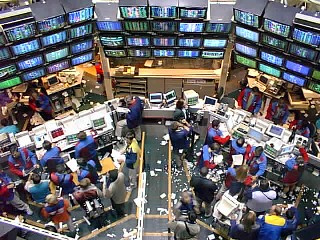Thanks to the gas tax “holiday” proposed by Senators McCain and Clinton, gasoline taxes (a component of carbon taxes) have become a major issue in the presidential campaign. Senators McCain and Clinton have been attacked across the political spectrum for pandering. Politicians from President Bush to House Speaker Pelosi have rejected the idea, as have newspaper editorial boards from the New York Times to the Wall Street Journal.
New York City Mayor Michael Bloomberg, a powerful carbon tax advocate, may have been the most succinct, calling a temporary suspension of the federal gasoline tax “about the dumbest thing I’ve heard in an awful long time from an economic point of view” and saying he did not see “any merit to it whatsoever” (NY Times, May 2). Economists have been nearly unanimous, with over 100 economists, including three Nobel Prize winners, signing a statement opposing the gas tax holiday.
In our last newsletter we acknowledged that “the ‘T’ word is unpopular with politicians,” but asserted that “awareness is growing that ‘putting a price on carbon’ is an essential element of any successful strategy to significantly reduce greenhouse gas emissions.” In fact, awareness is growing faster than we expected. We’re heartened by the widespread recognition that the gas tax holiday proposal is fundamentally flawed because it undercuts the need to properly price gasoline and would encourage gas use just when it is essential to discourage consumption. In breaking news, the Monday (May 5) New York Times will report that by 49% to 45%, more Americans think that lifting the gas tax is a bad idea than approve of the plan.
In addition, we are intrigued by a Wall Street Journal report that some members of Congress are advocating that proceeds of a windfall profits tax be used to provide rebates for consumers. It sounds a lot like the rebate we have proposed to return carbon tax revenues to the American people. While we take no position at this time on the merits of a windfall profits tax, it’s good to see thought being given to returning the windfall profit tax proceeds. It’s a step toward a revenue-neutral carbon tax.
Our next challenge is to convert the well-reasoned opposition to a gas tax holiday into support for a carbon tax. As a first step, we have begun preliminary planning for a Carbon Tax Conference to be held in Washington, D.C. in mid-November. The conference will be designed to focus public attention on a carbon tax as the best policy for reducing U.S. greenhouse gas emissions and is timed to occur just as a new administration and Congress begin establishing priorities and mapping out strategies. Interested in being involved in the early planning? If so, please let us know.
Please check our web page regularly for the latest developments on carbon tax issues and progress. We add important news stories to the “Headlines” column on our home page almost every day. Take a look at the excellent guest post by James Handley, an extraordinary volunteer at CTC, addressing the gas tax holiday issue. It was on our web page until today (in case you haven’t noticed, previous blog posts are listed just below the current post). Our next post will take up a related issue, the impact on demand of rising gasoline prices. There is more and more evidence that higher prices, such as would result from a carbon tax, lead to reduced consumption. That’s the premise of our proposed carbon tax and it’s being validated every day.
Finally, CTC does have to admit to one major failing. We’ve been so focused on policy issues and getting the message out that we haven’t spent the necessary time on fundraising. The result is predictable. We’re desperately short of money just when we need it the most. To continue playing our essential role, we need your financial help.
You can contribute to CTC in three ways, two of which are tax-deductible:
* Tax-deductible:
Write a check or money order to ELPC (Environmental Law & Policy Center), writing Carbon Tax Center in the memo line; mail it to ELPC at 35 East Wacker Drive, Suite 1300, Chicago, IL 60601. ELPC is CTC’s fiscal sponsor.
* Tax-deductible:
Make an on-line contribution via Groundspring by clicking on the DONATE NOW box on our website, www.carbontax.org.
* Not deductible:
Write a check or money order to Carbon Tax Center and send it to our New York City mailing address: CTC, 636 Broadway, Room 602, New York, NY 10012.
Please be as generous as you can, and please donate today. Thank you.
Sincerely,
Charles Komanoff
Dan Rosenblum

 Haven’t we been down this road before? Yes, a dozen years ago.
Haven’t we been down this road before? Yes, a dozen years ago.  Why is setting a price (or tax) for emissions more efficient than a cap? Because reducing greenhouse gas emissions is more like a marathon than a sprint. The cost of cutting emissions tends to go up with each additional reduction, while the benefit remains essentially constant. (Every ton of CO2 has the same heat-trapping effect.)
Why is setting a price (or tax) for emissions more efficient than a cap? Because reducing greenhouse gas emissions is more like a marathon than a sprint. The cost of cutting emissions tends to go up with each additional reduction, while the benefit remains essentially constant. (Every ton of CO2 has the same heat-trapping effect.) The year-long effort to enact congestion pricing in New York City had a lot going for it:
The year-long effort to enact congestion pricing in New York City had a lot going for it: On close examination, this "finding" turns flimsy. The fly in the ointment is that while all four Scandinavian countries have indeed levied some form of carbon tax since the early 1990s, in each case the tax levels so far have been on the "lite" side, making it difficult to tie changes in emissions to specific tax and revenue policies.
On close examination, this "finding" turns flimsy. The fly in the ointment is that while all four Scandinavian countries have indeed levied some form of carbon tax since the early 1990s, in each case the tax levels so far have been on the "lite" side, making it difficult to tie changes in emissions to specific tax and revenue policies. In recent years, New Mexico Democratic Sen. Jeff Bingaman has become the lawmaker most linked to this cause. His version of the safety valve emerged in 2005 in a legislative proposal that created a price cap on carbon. It would guarantee that American companies pay no more than $12 for every ton of carbon dioxide they release into the atmosphere. This rate would go up five percent annually beyond inflation.
In recent years, New Mexico Democratic Sen. Jeff Bingaman has become the lawmaker most linked to this cause. His version of the safety valve emerged in 2005 in a legislative proposal that created a price cap on carbon. It would guarantee that American companies pay no more than $12 for every ton of carbon dioxide they release into the atmosphere. This rate would go up five percent annually beyond inflation. Here are excerpts from the Wall Street Journal story, spiced with our commentary.
Here are excerpts from the Wall Street Journal story, spiced with our commentary. The article ends months of speculation that Bloomberg, a self-made billionaire who has emphasized a managerial, non-partisan approach to governing, would enter the race as an independent.
The article ends months of speculation that Bloomberg, a self-made billionaire who has emphasized a managerial, non-partisan approach to governing, would enter the race as an independent. While Nader has been roundly criticized and even ridiculed as a spoiler and perennial candidate (Nader was the Green Party candidate for president in 1996 and 2000, and he ran as an independent in 2004), his campaign platform includes unambiguous support for a carbon tax. “Adopt a carbon pollution tax” is Issue #6 on Nader’s campaign issues page,
While Nader has been roundly criticized and even ridiculed as a spoiler and perennial candidate (Nader was the Green Party candidate for president in 1996 and 2000, and he ran as an independent in 2004), his campaign platform includes unambiguous support for a carbon tax. “Adopt a carbon pollution tax” is Issue #6 on Nader’s campaign issues page, 